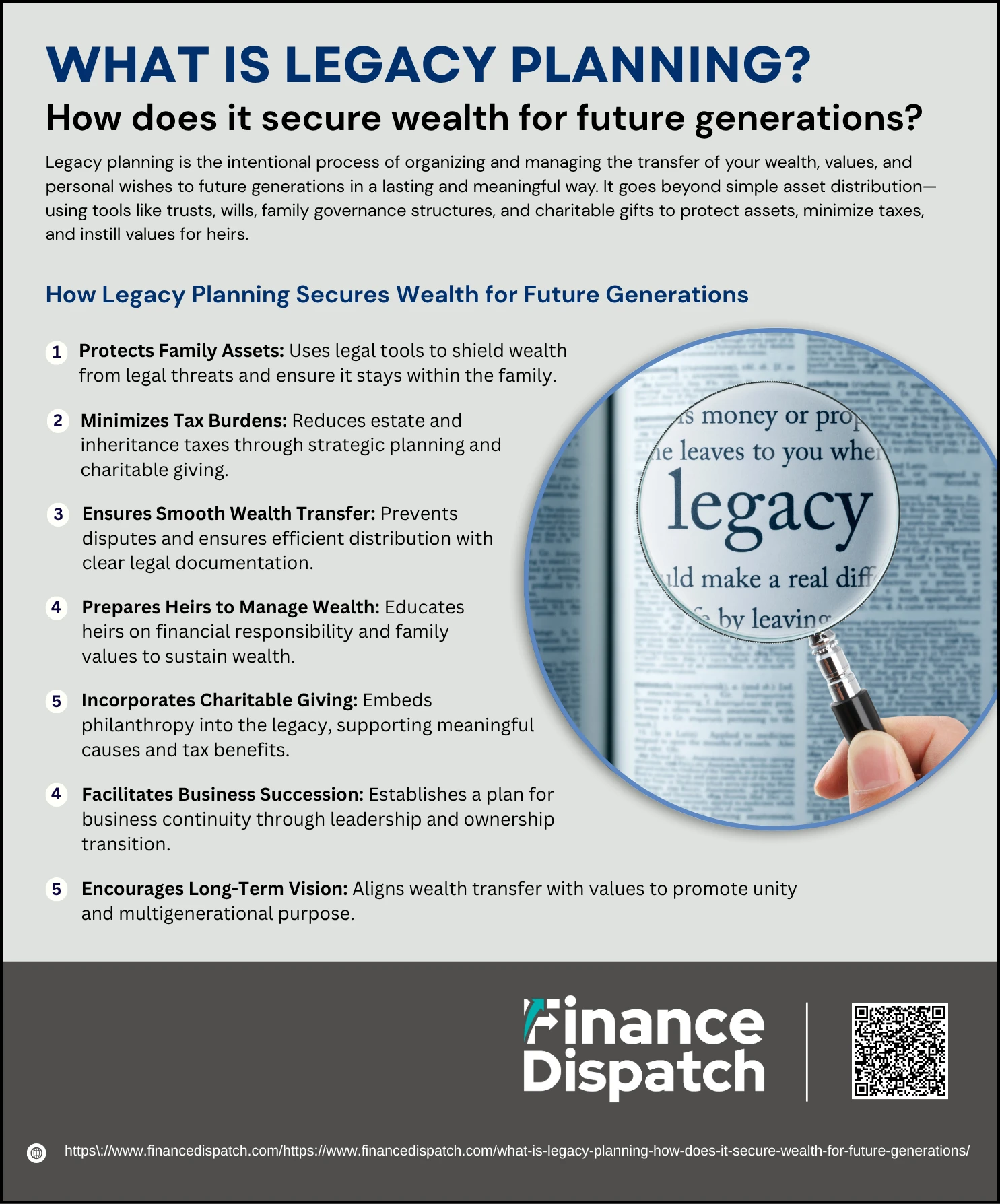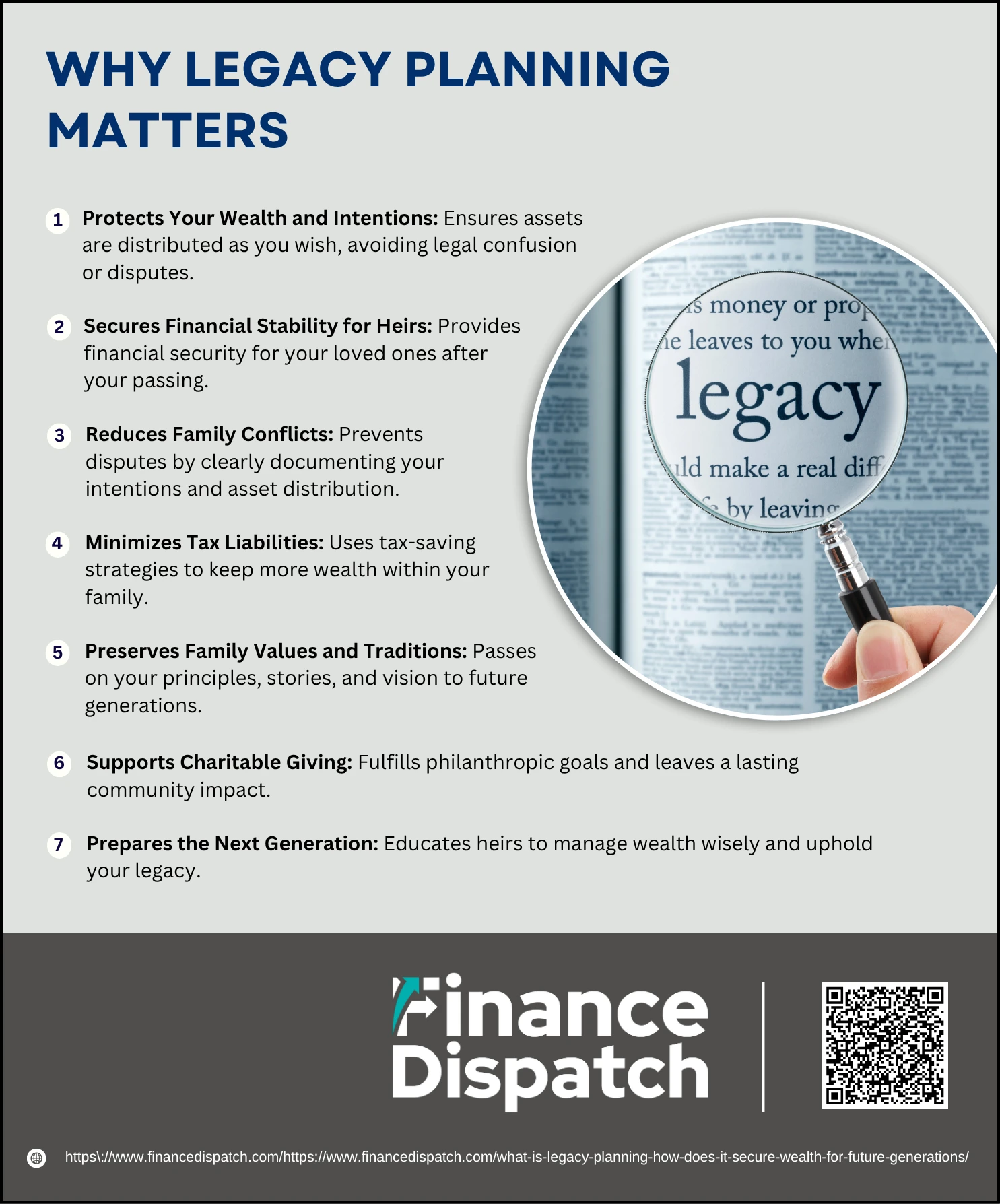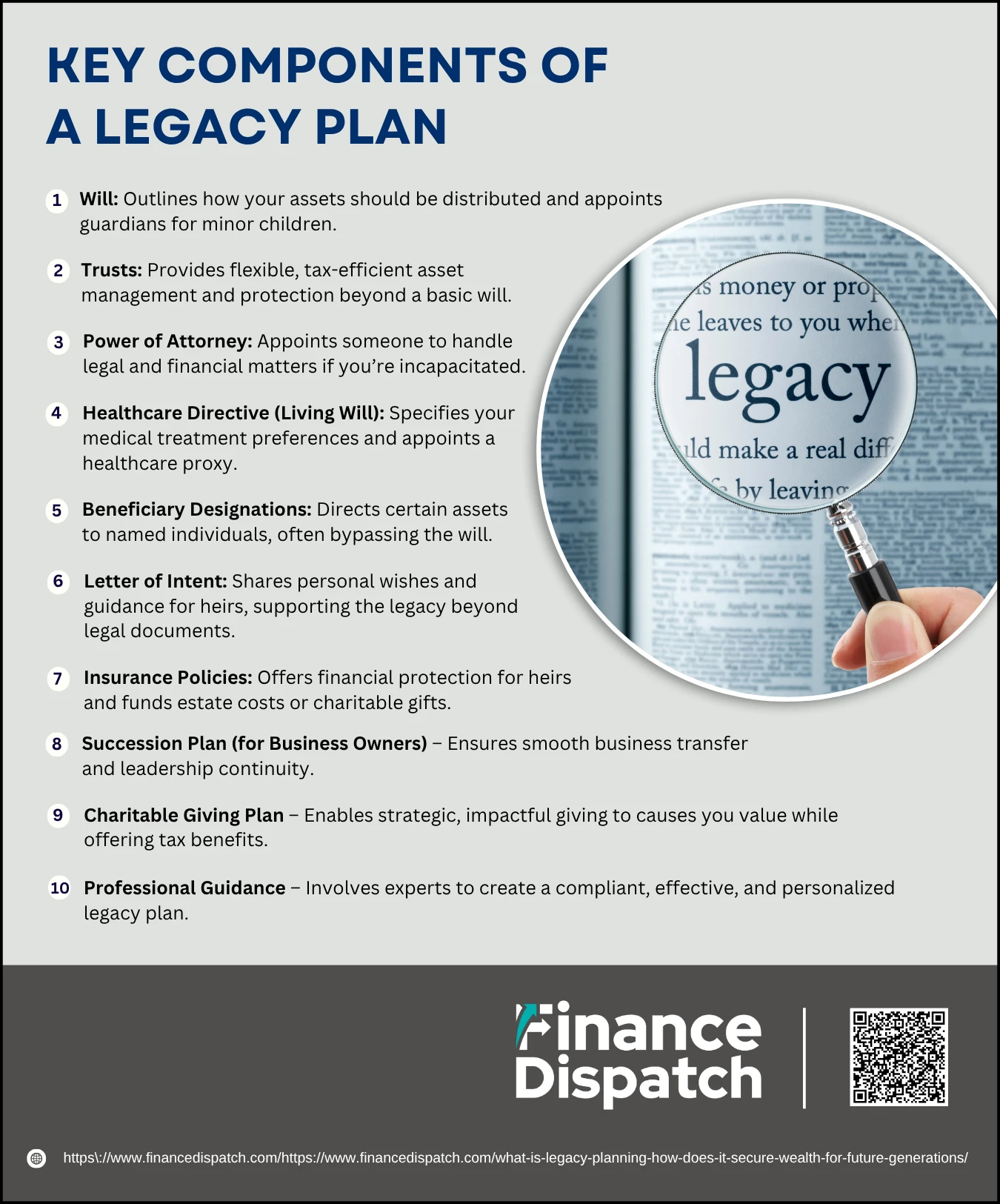Legacy planning is more than drafting a will or deciding who inherits your assets—it’s about intentionally shaping the financial and emotional imprint you leave behind. It involves creating a thoughtful, comprehensive plan that aligns your wealth with your values, ensuring that your life’s work continues to support your loved ones and the causes you care about long after you’re gone. In this article, we’ll explore what legacy planning truly means and how it serves as a powerful tool for securing wealth and guiding future generations.
What Is Legacy Planning?
Legacy planning is the process of organizing how your assets, values, and personal wishes will be passed on to your heirs and beneficiaries after your death. It goes beyond traditional estate planning by incorporating both financial and non-financial elements—such as family traditions, charitable intentions, and life lessons—into a long-term strategy. A well-crafted legacy plan may include tools like wills, trusts, life insurance policies, and beneficiary designations, all designed to protect your wealth, minimize tax liabilities, and ensure that your legacy reflects your personal values and goals.
Legacy Planning vs Estate Planning
While legacy planning and estate planning are often used interchangeably, they serve distinct but complementary purposes. Estate planning primarily focuses on the legal and financial distribution of assets after death, ensuring that your property is transferred according to your wishes. Legacy planning, however, takes a more holistic approach—emphasizing not only the transfer of wealth but also the transmission of values, family vision, and long-term impact across generations.
| Aspect | Legacy Planning | Estate Planning |
| Primary Focus | Wealth, values, and long-term impact | Legal distribution of assets |
| Scope | Broad—includes emotional, social, and philanthropic goals | Narrow—focuses on property, finances, and documents |
| Key Tools | Wills, trusts, education plans, charitable giving | Wills, trusts, powers of attorney |
| Goal | Create a lasting legacy aligned with personal values | Efficient transfer of assets and minimizing taxes |
| Beneficiaries’ Role | Prepared through communication and mentorship | Receive assets as specified |
| Time Horizon | Multigenerational | Post-death execution |
 How Legacy Planning Secures Wealth for Future Generations
How Legacy Planning Secures Wealth for Future Generations
Legacy planning is about more than just leaving behind money—it’s a forward-thinking process designed to preserve, protect, and purposefully transfer your wealth in a way that benefits your heirs long into the future. It weaves together legal strategies, financial foresight, and personal values to create a roadmap that secures your family’s financial stability while maintaining harmony and purpose across generations. Here’s how legacy planning plays a crucial role in securing wealth for those who come after you:
1. Protects Family Assets
Legacy planning utilizes legal instruments such as trusts, insurance policies, and asset protection strategies to shield your wealth from lawsuits, creditors, divorce settlements, and other unforeseen risks. This ensures that your assets remain within your intended circle of beneficiaries.
2. Minimizes Tax Burdens
A well-structured plan can take advantage of tax-saving tools like gifting strategies, charitable donations, and tax-advantaged accounts. This significantly reduces estate and inheritance taxes, preserving a larger share of your wealth for your heirs.
3. Ensures Smooth Wealth Transfer
Clear documentation through wills, trusts, and beneficiary designations eliminates ambiguity and reduces the risk of legal disputes. This helps ensure your wishes are honored and assets are distributed efficiently and peacefully.
4. Prepares Heirs to Manage Wealth
Legacy planning involves educating your heirs about financial literacy, investment responsibility, and family values. This preparation helps them make informed decisions, sustain the family wealth, and avoid common pitfalls like mismanagement or overspending.
5. Incorporates Charitable Giving
Many legacy plans include philanthropic elements that allow your wealth to contribute to causes that matter to you. This not only maximizes tax benefits but also instills a culture of giving and community impact in your family.
6. Facilitates Business Succession
For families with businesses, legacy planning provides a framework for transferring leadership and ownership. This ensures business continuity, preserves company culture, and reduces friction among successors.
7. Encourages Long-Term Vision
Legacy planning aligns financial decisions with family values and long-term goals. This promotes unity, purpose, and a multigenerational approach to wealth—turning inheritance into an opportunity for growth and shared legacy.
 Why Legacy Planning Matters
Why Legacy Planning Matters
Legacy planning goes far beyond deciding who gets what—it’s about preserving your life’s work, values, and intentions in a way that provides enduring benefits to your family and community. A thoughtful legacy plan acts as a blueprint that protects your assets, guides your loved ones, and helps ensure that your wealth is used wisely for generations to come. Without such a plan, even substantial estates can be diminished by taxes, mismanagement, or family disagreements. Here’s why taking the time to develop a legacy plan is one of the most meaningful financial decisions you can make:
1. Protects Your Wealth and Intentions
Legacy planning ensures your hard-earned assets are distributed exactly as you envision. It helps avoid scenarios where the absence of clear directives leads to delays, legal battles, or decisions that go against your wishes.
2. Secures Financial Stability for Heirs
A well-crafted plan helps your loved ones avoid financial uncertainty after your passing. Whether it’s funding a child’s education or providing for long-term care, legacy planning creates a reliable financial safety net.
3. Reduces Family Conflicts
One of the most overlooked benefits of legacy planning is the peace it brings to families. By clearly outlining your intentions in legal documents, you prevent potential disputes, favoritism claims, or emotional stress among your heirs.
4. Minimizes Tax Liabilities
Strategic tools such as trusts, gifting, and charitable contributions can dramatically reduce estate and inheritance taxes. This means more of your wealth stays in the family or goes to causes you care about, rather than being lost to taxation.
5. Preserves Family Values and Traditions
Legacy planning isn’t just about money—it’s also about what matters most to you. It offers a way to pass down your values, philosophies, and stories, helping shape the character and purpose of future generations.
6. Supports Charitable Giving
If philanthropy is part of your vision, a legacy plan can ensure your charitable goals are met through endowments, foundations, or donor-advised funds—extending your impact well beyond your lifetime.
7. Prepares the Next Generation
By integrating financial education and open conversations into the planning process, you equip your heirs with the knowledge and confidence to manage inherited wealth responsibly and keep your legacy strong.
 Key Components of a Legacy Plan
Key Components of a Legacy Plan
Creating a legacy plan involves more than just drafting a will—it’s a comprehensive process that integrates financial, legal, and personal elements to ensure your legacy is preserved and passed on exactly as you intend. A well-rounded legacy plan safeguards your wealth, outlines your wishes, and protects your loved ones from unnecessary stress and uncertainty. Whether your goal is to provide for your family, support charitable causes, or sustain a business, including these essential components will help you build a lasting legacy that aligns with your values and goals.
1. Will
A will is the foundation of any legacy plan. It specifies how your property and possessions should be distributed after your death and names an executor to oversee the process. It also allows you to appoint guardians for minor children, ensuring their care is handled according to your wishes.
2. Trusts
Trusts offer more control than a will alone. They can be used to distribute assets gradually, protect wealth from creditors, reduce estate taxes, and avoid probate. Common types include revocable living trusts, irrevocable trusts, and charitable remainder trusts, each serving different strategic purposes.
3. Power of Attorney
This legal document authorizes someone to act on your behalf in financial and legal matters if you become unable to manage them yourself. Without it, your loved ones may face legal barriers to making necessary decisions during difficult times.
4. Healthcare Directive (Living Will)
A healthcare directive outlines your preferences for medical treatment if you are incapacitated. It can include instructions on life support, resuscitation, and pain management, and it names a healthcare proxy to make decisions aligned with your values.
5. Beneficiary Designations
Assets like life insurance, retirement accounts, and pensions pass directly to beneficiaries named on file—often bypassing your will or trust. Keeping these designations updated is critical to ensure they reflect your current intentions.
6. Letter of Intent
Though not legally binding, a letter of intent communicates your personal wishes, such as how you want your funeral conducted or guidance on raising your children. It can also express your hopes for how inherited wealth is used, helping your family honor your legacy.
7. Insurance Policies
Life insurance is a powerful tool in legacy planning. It provides liquidity to cover debts, taxes, or immediate expenses, and it can also serve as a financial safety net for your dependents or fund charitable bequests.
8. Succession Plan (for Business Owners)
If you own a business, a succession plan is vital. It lays out who will take over, how ownership will transfer, and what steps are needed to ensure a smooth transition. Without it, your business may face instability or even closure.
9. Charitable Giving Plan
Whether through one-time donations, donor-advised funds, or setting up a foundation, a charitable giving strategy allows you to support the causes you care about and leave a positive impact beyond your lifetime. It can also provide tax benefits for your estate and heirs.
10. Professional Guidance
Crafting a legacy plan involves complex decisions and legal nuances. Financial advisors, estate planning attorneys, and tax professionals work together to ensure your plan is legally sound, tax-efficient, and aligned with your overall goals. Their expertise helps you avoid common pitfalls and adjust your plan as life changes.
Steps to Create a Legacy Plan
Building a legacy plan is a thoughtful process that requires clarity, preparation, and professional guidance. It’s about taking deliberate actions to ensure your wealth, values, and wishes are passed on effectively and responsibly. Whether you’re just starting or refining an existing plan, following these steps will help you lay a solid foundation for your legacy and bring peace of mind for both you and your loved ones.
1. Define Your Goals and Vision
Start by identifying what you want your legacy to achieve—whether it’s providing for family, preserving a business, supporting charities, or all of the above.
2. Take Inventory of Assets and Liabilities
Compile a detailed list of your financial accounts, real estate, investments, valuables, and any outstanding debts to understand your complete financial picture.
3. Identify Your Heirs and Beneficiaries
Decide who will inherit your assets and in what proportions. Consider family members, friends, charitable organizations, or educational institutions.
4. Establish or Update Key Documents
Create or revise your will, trusts, power of attorney, and healthcare directives to ensure your wishes are clearly outlined and legally binding.
5. Plan for Tax Efficiency
Work with a financial advisor or estate planner to implement strategies—like trusts, gifting, or charitable contributions—to reduce the tax burden on your estate.
6. Include Instructions for Business Succession
If you own a business, create a clear succession plan that outlines the transfer of leadership and ownership.
7. Incorporate Philanthropy
Decide if you want part of your legacy to support charitable causes. Set up a giving strategy through donor-advised funds, foundations, or trusts.
8. Communicate with Family Members
Open conversations with your heirs can help avoid misunderstandings and ensure that everyone is aligned with your vision.
9. Review and Update Regularly
Life events such as marriages, births, deaths, or changes in financial status may require you to revisit and revise your legacy plan periodically.
10. Seek Professional Guidance
Consult estate planning attorneys, financial advisors, and tax professionals to ensure your legacy plan is comprehensive, compliant, and customized to your needs.
The Role of Professionals in Legacy Planning
Professionals play a critical role in shaping and securing a successful legacy plan. Estate planning attorneys, financial advisors, tax consultants, and insurance specialists each bring unique expertise that helps you navigate complex legal, financial, and tax considerations. These experts ensure that your documents are legally sound, your assets are protected, and your plan aligns with current regulations. They can also identify tax-efficient strategies, tailor trusts to meet your goals, and help facilitate difficult family discussions. By working with a team of trusted professionals, you gain the clarity and confidence needed to build a legacy that honors your wishes and supports future generations.
Real-Life Examples of Legacy Impact
Legacy planning isn’t just a financial strategy—it’s a deeply personal endeavor that can transform lives and communities long after you’re gone. Whether it’s preserving a family business, supporting a charitable mission, or ensuring a child’s education, the ripple effects of a well-crafted legacy plan are far-reaching. Below are some real-life inspired examples that highlight how thoughtful legacy planning can make a lasting impact:
1. Family Business Continuity
A father passed his construction company to his daughter through a succession plan that included leadership training and legal ownership transfer, preserving jobs and family wealth.
2. Education Fund for Grandchildren
A grandmother created a trust that funded her grandchildren’s college tuition, ensuring they had the financial support to pursue higher education without debt.
3. Charitable Foundation Creation
A couple established a private foundation to support environmental causes, enabling their family to continue their philanthropic mission for generations.
4. Philanthropic Giving Through Life Insurance
An individual named a children’s hospital as the beneficiary of a life insurance policy, resulting in a significant tax-free donation after their passing.
5. Preserving Family Values Through a Letter of Intent
Along with their will, a couple wrote a heartfelt letter of intent sharing their life principles and wishes for how the family’s wealth should be used responsibly and ethically.
6. Blended Family Harmony
Through clear estate planning, a man with children from two marriages used trusts to fairly distribute his assets, preventing disputes and fostering harmony among heirs.
Conclusion
Legacy planning is about more than just transferring wealth—it’s about preserving your life’s work, values, and intentions in a way that continues to benefit your loved ones and the causes you care about. By taking the time to craft a thoughtful legacy plan, you gain peace of mind knowing your assets will be managed responsibly, your heirs will be supported, and your wishes will be honored. Whether you’re focused on family security, philanthropy, or business continuity, legacy planning provides the structure needed to leave a meaningful, lasting impact that endures across generations.



